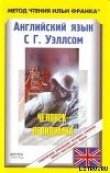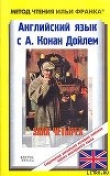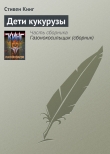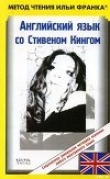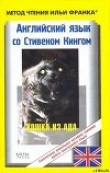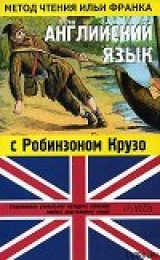
Текст книги "Английский язык с Робинзоном Крузо (в пересказе для детей)"
Автор книги: Илья Франк
Соавторы: James Baldwin
Жанры:
Языкознание
,сообщить о нарушении
Текущая страница: 8 (всего у книги 21 страниц) [доступный отрывок для чтения: 8 страниц]
I HARVEST MY GRAIN
(я собираю мое зерно = мой урожай)
I CANNOT tell you how glad I was to get to my old house again (я не могу сказать = передать вам, как рад я был попасть в мой старый дом вновь) and lie down in my good hammock bed (и лечь в мою кровать-гамак).
I had been away for nearly a month (меня не было /здесь/ почти месяц; to be away – уходить, отлучиться; отсутствовать: «быть прочь»).

I was so tired from my long journey (так устал: «был таким уставшим» от длинного путешествия) that I stayed in my castle nearly a week (что я остался в замке почти на неделю).
While I was thus resting myself (пока я так отдыхал), I made a cage for my parrot (я смастерил клетку для попугая) which I named Poll (которого я назвал Попка; poll – стандартная кличка для попугая). He was very gentle for a parrot (он был очень послушным/смирным для попугая; gentle – /уст./ благородный; мягкий, добрый; послушный, смирный /обычно о животных/), and soon became very fond of me (и вскоре стал любить меня: «стал очень любящим меня/привязанным ко мне»; to become – становиться; fond of smb., smth. – любящий кого-л., что-л.).
Then I began to think of the kid (затем я начал думать о козленке) that I had left in my summer bower (которого я оставил в беседке). So I went with my dog to fetch it (поэтому я пошел со своей собакой забрать его).
I found it where I had left it (я нашел его там, где оставил его; to leave – оставлять, покидать). It had eaten all the grass inside of the fence (он съел всю траву внутри ограды) and was now very hungry (и был теперь очень голоден).
I gave it as much as it wished (я дал ему ее /травы/ столько, сколько он хотел), and then I tied the string to it to lead it away (а затем привязал веревку к нему, чтобы увести его). But there was no need of that (но в том не было нужды), for it was quite tame (потому что он был вполне послушным; tame – прирученный, одомашненный; укрощенный /о животных/).
It followed me everywhere (он следовал за мной всюду). It was very gentle and loving (он был очень добрым/смирным и любящим).
I had now a number of pets (теперь у меня было несколько: «число» домашних животных; number – число; a number – некоторое количество, несколько) and was no longer lonesome (и я больше не был одиноким).
My life was much happier (моя жизнь была намного счастливее) than it had been while I was sailing the seas (чем она была, когда я плавал по морям). I took delight in many things (я радовался многим вещам: «брал отраду во многих вещах»; delight – радость, отрада) that I had never cared for before (на которые ранее я никогда не обращал внимания/к которм прежде был равнодушен; to care for smb., smth. – заботиться о ком-л., чем-л.; проявлять интерес, испытывать любовь/привязанность к кому-л., чему-л.).
My barley and rice had grown well (ячмень и рис выросли хорошо; to grow – расти) and in another month would be ready to be harvested (и через месяц будут готовы к тому, чтобы быть собранными; harvest – урожай; to harvest – снимать урожай).
But one day I saw that some animals had been in the field (но однажды я увидел, что некоторые животные побывали в поле). Goats and rabbits had trampled upon the green stalks (козы и кролики потоптали зеленые стебли) and had eaten the long blades of barley (и поели длинные листья ячменя).
If things kept on this way I should soon lose my grain (если так будет продолжаться, я вскоре потеряю мое зерно).
There was nothing to be done but to build a fence or hedge around the field (ничего не оставалось делать, как только построить забор или устроить живую изгородь вокруг поля; hedge – /живая/ изгородь; ограда). This was easy, for the field was not large (это было легко, так как поле не было большим).
I drove tall stakes into the ground all around my growing crops (я вбил длинные колья в землю вокруг моего растущего урожая; to drive – гнать; вгонять, вбивать). These stakes were so close together (они были так близко вместе = друг к другу) that not even a rabbit could get between them (что даже кролик не мог пробраться между них).
Then I tied my dog near the gate of the little field (затем я привязал собаку у ворот маленького поля), so that he would bark whenever any animal came near (так, чтобы она бы залаяла, когда какое-либо животное приблизится; whenever – всякий раз когда; когда бы ни).
My grain was now safe from the beasts (мое зерно было = мои злаки были теперь в безопасности от зверей). It grew fast (оно росло быстро). The barley sent out large heads (ячмень выпустил большие головки = колосья) which soon began to ripen (которые скоро начали зреть).
But now the birds came down in great flocks to rob me (но теперь птицы спускались большими стаями, чтобы грабить меня). They sat on the fence (они сидели на заборе), they flew among the stalks of grain (они летали между стеблями зерна; to fly – летать), they carried away all the ripe barley they could find (они уносили весь зрелый ячмень, который могли найти).
This troubled me very much (это беспокоило меня очень сильно). The most of the grain was still green (большая часть зерна была еще зеленой). But I feared that as soon as it ripened I should lose it all (но я боялся, что как только оно созреет, я потеряю его полностью).
I loaded my gun (я зарядил ружье) and went out to the field (и вышел в поле). There I saw the thieves (там я видел воров), sitting on the fence and watching me (сидящих на заборе и наблюдающих за мной). I was so angry (я был таким сердитым/раздраженным) that I fired right among them and killed three (что выстрелил прямо между ними и убил троих).
"Now I will show you how to steal my grain (сейчас я покажу вам, как воровать мое зерно)!" I cried.
I put up a long pole in the center of the field (я установил длинный шест в центре поля), and on top of it I hung the three dead birds (и на верхушке его повесил три мертвых птицы; to hang – вешать).
"This will I do to all that venture to come into my field (это я сделаю со всеми, кто решится зайти на мое поле)," I said.
Strange to say, this ended all my troubles (странно сказать, но это прекратило все мои горести). Not another bird came to that place so long as my scarecrows hung there (ни одна другая птица не приходила = не прилетала на это место, пока мои пугала висели там; scarecrow – пугало; to scare – пугать; crow – ворона). In fact, the birds went away from that part of the island, and I did not soon see another (на самом деле, птицы покинули эту часть острова, и я не скоро увидел другую = не скоро увидел других птиц).
thus [ðʌs], parrot [ˈpærǝt], delight [dɪˈlaɪt], lose [lu:z], angry [ˈænɡrɪ], scarecrow [ˈskeǝkrǝu]
I HARVEST MY GRAIN
I CANNOT tell you how glad I was to get to my old house again and lie down in my good hammock bed.
I had been away for nearly a month. I was so tired from my long journey that I stayed in my castle nearly a week.
While I was thus resting myself, I made a cage for my parrot which I named Poll. He was very gentle for a parrot, and soon became very fond of me.
Then I began to think of the kid that I had left in my summer bower. So I went with my dog to fetch it.
I found it where I had left it. It had eaten all the grass inside of the fence and was now very hungry.
I gave it as much as it wished, and then I tied the string to it to lead it away. But there was no need of that, for it was quite tame.
It followed me everywhere. It was very gentle and loving.
I had now a number of pets and was no longer lonesome.
My life was much happier than it had been while I was sailing the seas. I took delight in many things that I had never cared for before.
My barley and rice had grown well and in another month would be ready to be harvested.
But one day I saw that some animals had been in the field. Goats and rabbits had trampled upon the green stalks and had eaten the long blades of barley.
If things kept on this way I should soon lose my grain.
There was nothing to be done but to build a fence or hedge around the field. This was easy, for the field was not large.
I drove tall stakes into the ground all around my growing crops. These stakes were so close together that not even a rabbit could get between them.
Then I tied my dog near the gate of the little field, so that he would bark whenever any animal came near.
My grain was now safe from the beasts. It grew fast. The barley sent out large heads which soon began to ripen.
But now the birds came down in great flocks to rob me. They sat on the fence, they flew among the stalks of grain, they carried away all the ripe barley they could find.
This troubled me very much. The most of the grain was still green. But I feared that as soon as it ripened I should lose it all.
I loaded my gun and went out to the field. There I saw the thieves, sitting on the fence and watching me. I was so angry that I fired right among them and killed three.
"Now I will show you how to steal my grain!" I cried.
I put up a long pole in the center of the field, and on top of it I hung the three dead birds.
"This will I do to all that venture to come into my field," I said.
Strange to say, this ended all my troubles. Not another bird came to that place so long as my scarecrows hung there. In fact, the birds went away from that part of the island, and I did not soon see another.
I WORK UNDER MANY DIFFICULTIES
(я работаю в трудных условиях: «под многими сложностями»)
MY barley ripened (мой ячмень созрел) and was ready to be harvested (был готов быть собранным). I had neither scythe nor sickle to cut it down (у меня не было ни косы, ни серпа, чтобы срезать его).
But you will remember that I had two old swords which I had found in the ship (но вы вспомните, что я имел две шпаги, которые я нашел на корабле).

With one of the swords I cut off the heads of the barley and dropped them into a big basket I had made (одной шпагой я срезал колосья ячменя и бросал их в большую корзину, /которую/ я сделал). I carried these heads into my cave (я относил колосья в мою пещеру) and thrashed out the grain with my hands (и молотил зерно руками).
When all my harvesting was done (когда весь сбор урожая был закончен: «был сделан»), I measured the grain (я взвесил зерно; to measure – измерять, мерить). I had two bushels of rice (у меня было два бушеля[5]5
бушель – мера емкости = 36,3 л
[Закрыть] риса) and two bushels and a half of barley (и два с половиной бушеля ячменя).
This pleased me very much (это очень меня порадовало). I felt now that I should soon be able to raise grain enough for food (я чувствовал теперь, что скоро смогу вырастить достаточно зерна для еды).
Have you ever thought how many things are necessary for the making of your bread (вы когда-нибудь думали, сколько вещей необходимы для приготовления хлеба)?
You have nothing to do but eat the bread after others have made it (вы не знаете других забот, как /только/ есть хлеб после того, как другие сделали его). But I had to sow (но я должен был сеять), to reap (жать), to thrash (молотить), to grind (молоть), to sift (просеивать), to mix (смешивать), and to bake (и печь).
To do all these I needed many tools (чтобы проделать все это, мне нужно было много инструментов).
I had no plow to turn up the ground (у меня не было плуга, чтобы вскапывать землю; to turn up – поднимать вверх; загибать; вскапывать; вспахивать; to turn – поворачивать, переворачивать). I had no spade nor shovel with which to dig it (у меня не было ни лопаты, ни мотыги, которыми копать ее). But with great labor (с большим трудом) I made me a wooden spade (я смастерил себе деревянную лопату), which was better than nothing (которая была лучше, чем ничего).
After the ground was turned up (после того, как земля была вскопана), I sowed the seed by scattering it with my hands (я посеял зерно, разбрасывая его руками; to scatter – разбрасывать, раскидывать; рассыпать). But it must be covered so it would grow (но оно должно быть накрыто /землей/, чтобы оно росло), and I had no harrow (а у меня не было бороны). I cut down the branch of a tree (я срезал ветку дерева), and dragged it over the field (и протащил ее по полю; to drag – тянуть, тащить, волочить). This, I think, was the way that people in old times harrowed their ground (это, я думаю, был способ, каким люди в старые времена боронили землю).
The third thing to be done was to build a fence around my field (третье дело, которое нужно было сделать, было построить забор вокруг поля). After that came the reaping (после этого пришла жатва), the curing (заготовка), the carrying home (доставка домой), the thrashing (молотьба), the parting of the grain from the chaff (отделение зерна от мякины), the grinding (помол).
I needed a mill to do the grinding (мне нужна была мельница, чтобы молоть). I needed a sieve to sift the flour (сито, чтобы просеивать муку). I needed yeast and salt to mix with the dough (мне нужны были дрожжи и соль, чтобы смешать /их/ с тестом). I needed an oven to bake it (мне нужна была печь, чтобы испечь его).
I had to do without the most of these things (мне приходилось обходиться без большинства этих вещей). And this made my work very slow and hard (и это делало мою работу очень медленной и тяжелой; hard – жесткий; тяжелый /о работе/).
I was very lucky in having saved so many tools from the wreck (мне повезло, /что я/ сохранил так много инструментов с остова разбитого судна), and for this I was indeed thankful (и за это я в самом деле был благодарен). What a hard case I would have been in if I had saved nothing at all (в каком затруднительном положении: «жестком/тяжелом случае» был бы я, если бы не сохранил/не спас ничего вообще)!
From time to time (время от времени), as I felt the need of things (когда чувствовал необходимость вещей = в какой-либо вещи) I made a number of tools that served me very well (я делал ряд инструментов, которые служили мне очень хорошо). They were not such tools as you would buy at the store (они не были такими инструментами, которые вы бы купили в магазине), but what did it matter (но имело ли это значение)?
I have already told you about the shovel which I made from a piece of hard wood (я уже рассказал вам о лопате, которую я сделал из куска твердого дерева). Next to the shovel I needed a pickax most of all (после лопаты мне больше всего нужна была киркомотыга).
Among the many things that I had saved from the wreck (среди многих вещей, которые я сохранил с разбитого корабля), I found an old crowbar (я нашел старый лом). This I heated in the fire until it was almost white hot (я нагрел его на огне, пока он не стал почти белым от жара; hot – горячий; жаркий; разогретый; накаленный).
I then found that I could bend it quite easily (затем я обнаружил, что мог согнуть его довольно легко). Little by little I shaped it until I had made quite a good pickax of it (мало-помалу я придавал ему /нужную/ форму, пока я не сделал из него довольно хорошую киркомотыгу; shape – форма; to shape – придавать форму, формировать; делать по какому-л. образцу). Of course, it was heavy and not at all pretty (конечно, она была тяжелой и совсем не красивой). But who would look for beauty in a pickax (но кто бы стал искать красоту в киркомотыге)?
I at first felt the need of some light baskets (на первых порах я чувствовал необходимость = мне не хватало легких корзин) in which to carry my fruit and grain (в которых /мог бы/ носить мои плоды и зерно). So I began to study how baskets are made (поэтому я стал теперь изучать, как делаются/сделаны корзины; to study – изучать, исследовать /внимательно, тщательно/; рассматривать, обдумывать, взвешивать).
It was not until I had searched almost every nook on the island (только после того, как я обыскал каждый уголок острова) that I found some long slender twigs (я нашел длинные гибкие прутья) that would bend to make wicker ware (которые бы гнулись, чтобы сделать ивовую лозу = которые можно было гнуть, как ивовую лозу; wicker – ивовый прут, лоза; ware – изделия). Then I spent many an hour learning how to weave these twigs together (затем я провел много часов, учась, как сплетать эти прутья вместе) and shape them into the form of a basket (и придавать им форму корзины).
In the end (в конце концов), however (тем не менее), I was able to make as good baskets as were ever bought in the market (я был способен делать такие хорошие корзины, которые когда-либо покупались на рынке).
I had quite a goodly number of edge tools (у меня было довольно большое количество режущих инструментов; goodly – большой, большого размера; крупный, внушительный). Among these there were three large axes (среди них было три больших топора) and a great store of hatchets (и большой запас топориков); for you will remember that we carried hatchets to trade with the savages (так как вы должны помнить, что мы везли топорики, чтобы торговать/обмениваться с дикарями). I had also many knives (у меня было также много ножей).
But all these became very dull with use (но все они стали тупыми от использования). I had saved a grindstone from the wreck (я спас точильный камень с остова корабля), but I could not turn it and grind my tools at the same time (но не мог крутить его и точить инструменты в одно и то же время).
I studied hard to overcome this difficulty (я напряженно думал, как преодолеть эту трудность). At last (наконец), I managed to fasten a string to the crank of the grindstone in such a way that I could turn it with my foot (мне удалось прикрепить веревку к ручке точильного камня так, что я мог вертеть его ногой).
My tools were soon sharp, and I kept them so (мои инструменты вскоре были острыми, и я держал их такими = поддерживал в таком состоянии).
ripen [ˈraɪp(ǝ)n], scythe [ˈsaɪð], sword [sɔ:d], measure [ˈmeʒǝ], bushel [buʃl], necessary [ˈnesǝs(ǝ)rɪ], thrash [Ɵræʃ], harrow [ˈhærǝu], field [fi:ld], flour [ˈflauǝ], yeast [ji:st], salt [sɔ:lt], dough [ˈdǝu], until [ǝnˈtɪl], axe [æks], manage [ˈmænɪʤ], fasten [fɑ:sn]
I WORK UNDER MANY DIFFICULTIES
MY barley ripened and was ready to be harvested. I had neither scythe nor sickle to cut it down.
But you will remember that I had two old swords which I had found in the ship. With one of the swords I cut off the heads of the barley and dropped them into a big basket I had made. I carried these heads into my cave and thrashed out the grain with my hands.
When all my harvesting was done, I measured the grain. I had two bushels of rice and two bushels and a half of barley.
This pleased me very much. I felt now that I should soon be able to raise grain enough for food.
Have you ever thought how many things are necessary for the making of your bread?
You have nothing to do but eat the bread after others have made it. But I had to sow, to reap, to thrash, to grind, to sift, to mix, and to bake.
To do all these I needed many tools.
I had no plow to turn up the ground. I had no spade nor shovel with which to dig it. But with great labor I made me a wooden spade, which was better than nothing.
After the ground was turned up, I sowed the seed by scattering it with my hands. But it must be covered so it would grow, and I had no harrow. I cut down the branch of a tree, and dragged it over the field. This, I think, was the way that people in old times harrowed their ground.
The third thing to be done was to build a fence around my field. After that came the reaping, the curing, the carrying home, the thrashing, the parting of the grain from the chaff, the grinding.
I needed a mill to do the grinding. I needed a sieve to sift the flour. I needed yeast and salt to mix with the dough. I needed an oven to bake it.
I had to do without the most of these things. And this made my work very slow and hard.
I was very lucky in having saved so many tools from the wreck, and for this I was indeed thankful. What a hard case I would have been in if I had saved nothing at all!
From time to time, as I felt the need of things I made a number of tools that served me very well. They were not such tools as you would buy at the store, but what did it matter?
I have already told you about the shovel which I made from a piece of hard wood. Next to the shovel I needed a pickax most of all.
Among the many things that I had saved from the wreck, I found an old crowbar. This I heated in the fire until it was almost white hot.
I then found that I could bend it quite easily. Little by little I shaped it until I had made quite a good pickax of it. Of course, it was heavy and not at all pretty. But who would look for beauty in a pickax?
I at first felt the need of some light baskets in which to carry my fruit and grain. So I began to study how baskets are made.
It was not until I had searched almost every nook on the island that I found some long slender twigs that would bend to make wicker ware. Then I spent many an hour learning how to weave these twigs together and shape them into the form of a basket.
In the end, however, I was able to make as good baskets as were ever bought in the market.
I had quite a goodly number of edge tools. Among these there were three large axes and a great store of hatchets; for you will remember that we carried hatchets to trade with the savages. I had also many knives.
But all these became very dull with use. I had saved a grindstone from the wreck, but I could not turn it and grind my tools at the same time.
I studied hard to overcome this difficulty. At last, I managed to fasten a string to the crank of the grindstone in such a way that I could turn it with my foot.
My tools were soon sharp, and I kept them so.

